雅思写作满分范文:读书期间的工作利弊
工作的好处和坏处英文作文

工作的好处和坏处英文作文The Pros and Cons of Working.Working is an integral part of human life, providing not only a means to earn a livelihood but also numerous other benefits. However, like any other aspect of life, working too has its downsides. In this article, we will explore the advantages and disadvantages of working to gain a comprehensive understanding of its impact on our lives.Advantages of Working.1. Financial Independence: The primary benefit of working is earning a salary or income, which enables individuals to become financially independent. This income can be used to meet daily expenses, save for future goals, and invest in various opportunities. Working provides a sense of security and stability, knowing that one has the means to support oneself and one's family.2. Personal Growth and Development: Working offers numerous opportunities for personal growth and development. It exposes individuals to new challenges, experiences, and knowledge, which helps them grow both professionally and personally. Working also helps individuals develop skills such as communication, teamwork, problem-solving, and decision-making, which are crucial for success in life.3. Social Networking: Working provides an opportunity to meet and interact with people from different backgrounds and professions. This interaction helps individuals build social networks and expand their horizons. These networks can be beneficial in various ways, such as providing career opportunities, learning new things, and gaining support and advice.4. Purpose and Fulfillment: Working gives individuals a sense of purpose and fulfillment. It provides an opportunity to contribute to society, whether it is through providing a service, creating a product, or advancing research. Working in a field that aligns with one's interests and values can provide immense satisfaction andfulfillment.5. Boosts Confidence: Regular work and achieving success in it can significantly boost one's confidence. The sense of accomplishment and pride gained from working hard and achieving goals can help individuals feel more confident in their abilities and skills. This confidence can spill over into other areas of life, such as relationships, hobbies, and personal development.Disadvantages of Working.1. Stress and Anxiety: Working can often lead to stress and anxiety, particularly in high-pressure jobs or environments. Deadlines, workload, and the constant need to perform can take a toll on one's mental health. Long working hours and a lack of work-life balance can also contribute to stress and anxiety.2. Job Security Concerns: Despite the benefits of working, job security is always a concern. Job losses, layoffs, and changes in company policies can leaveindividuals feeling insecure about their future. This uncertainty can lead to stress and anxiety and affect one's ability to plan for the future.3. Conflicts and Unhappiness: Working with different people can sometimes lead to conflicts and unhappy work environments. Differences in opinions, work styles, and personalities can cause tension and不满, affecting work productivity and employee morale.4. Health Issues: Prolonged sitting, irregular work hours, and stressful work environments can lead to various health issues such as obesity, heart disease, and mental health problems. Working can also affect one's sleep cycle, leading to fatigue and lack of energy.5. Limited Time for Other Activities: Working often takes up a significant amount of time, leaving individuals with limited time for other activities such as hobbies, spending time with family and friends, and pursuing personal interests. This can lead to a lack of balance in one's life and affect their overall happiness and well-being.In conclusion, while working provides numerous benefits such as financial independence, personal growth, social networking, purpose and fulfillment, and boosted confidence, it also has its downsides. Stress, job security concerns, conflicts and unhappiness, health issues, and limited time for other activities are some of the disadvantages of working. It is important for individuals to strike abalance between work and other aspects of life to ensure their overall happiness and well-being.。
专升本就业利弊英语作文
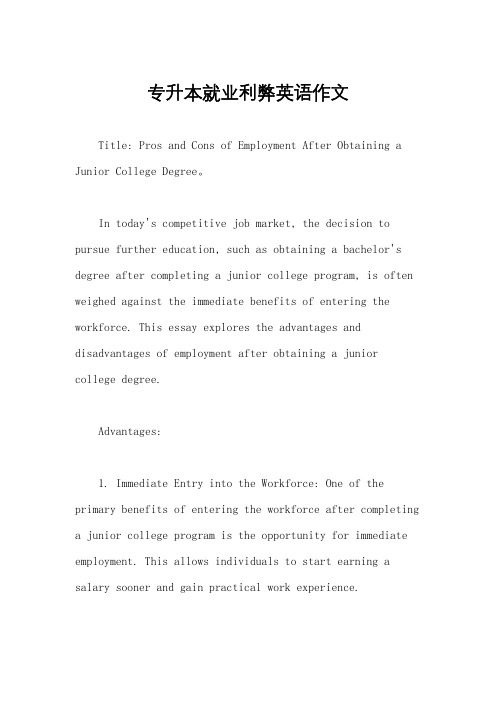
专升本就业利弊英语作文Title: Pros and Cons of Employment After Obtaining a Junior College Degree。
In today's competitive job market, the decision to pursue further education, such as obtaining a bachelor's degree after completing a junior college program, is often weighed against the immediate benefits of entering the workforce. This essay explores the advantages and disadvantages of employment after obtaining a junior college degree.Advantages:1. Immediate Entry into the Workforce: One of the primary benefits of entering the workforce after completing a junior college program is the opportunity for immediate employment. This allows individuals to start earning a salary sooner and gain practical work experience.2. Cost Savings: Pursuing employment directly after obtaining a junior college degree can save significant costs associated with pursuing further education. This includes tuition fees, accommodation expenses, and other related costs.3. Work Experience: By entering the workforce early, individuals have the chance to gain valuable work experience, which can enhance their resume and improvetheir long-term career prospects. Practical experience is highly valued by employers and can often outweigh academic qualifications.4. Financial Independence: Employment after junior college provides individuals with the opportunity to become financially independent at an earlier stage in their lives. This financial stability can empower individuals to pursue further education or other personal goals in the future.Disadvantages:1. Limited Career Opportunities: While a junior collegedegree may qualify individuals for entry-level positions, advancement opportunities may be limited without abachelor's degree or higher qualification. This can result in a narrower range of career options and slower career progression in the long term.2. Lower Earning Potential: In many industries, individuals with higher levels of education tend to command higher salaries. By entering the workforce with only a junior college degree, individuals may miss out on higher-paying job opportunities that require a bachelor's degree or higher qualification.3. Skill and Knowledge Gap: Depending on the field of study, individuals who enter the workforce after junior college may lack certain skills and knowledge that are typically acquired through further education. This could potentially hinder their ability to compete with candidates who have higher qualifications.4. Professional Development Opportunities: Many employers offer professional development and trainingprograms to employees with higher qualifications. By not pursuing further education, individuals may miss out on these opportunities for career advancement and skill enhancement.In conclusion, the decision to enter the workforceafter obtaining a junior college degree involves weighing the immediate benefits of employment against the long-term advantages of further education. While immediate employment provides financial stability and practical experience, it may also limit career opportunities and earning potential in the future. Ultimately, individuals should carefully consider their career goals and aspirations before making a decision.。
Simon考官范文-雅思写作Task 2: 读书与工作 essay
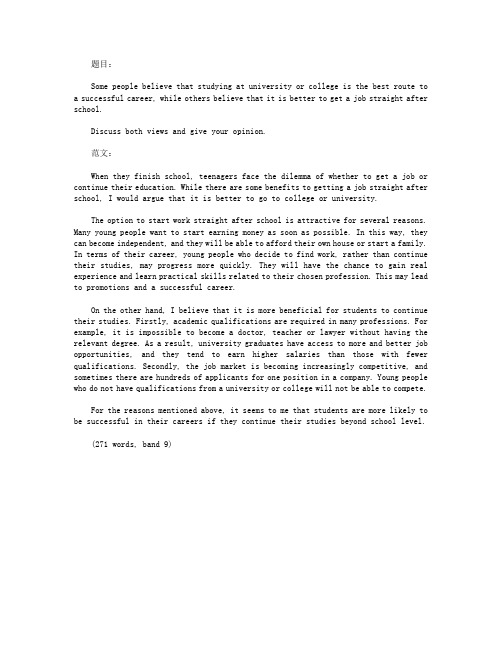
题目:Some people believe that studying at university or college is the best route to a successful career, while others believe that it is better to get a job straight after school.Discuss both views and give your opinion.范文:When they finish school, teenagers face the dilemma of whether to get a job or continue their education. While there are some benefits to getting a job straight after school, I would argue that it is better to go to college or university.The option to start work straight after school is attractive for several reasons. Many young people want to start earning money as soon as possible. In this way, they can become independent, and they will be able to afford their own house or start a family. In terms of their career, young people who decide to find work, rather than continue their studies, may progress more quickly. They will have the chance to gain real experience and learn practical skills related to their chosen profession. This may lead to promotions and a successful career.On the other hand, I believe that it is more beneficial for students to continue their studies. Firstly, academic qualifications are required in many professions. For example, it is impossible to become a doctor, teacher or lawyer without having the relevant degree. As a result, university graduates have access to more and better job opportunities, and they tend to earn higher salaries than those with fewer qualifications. Secondly, the job market is becoming increasingly competitive, and sometimes there are hundreds of applicants for one position in a company. Young people who do not have qualifications from a university or college will not be able to compete.For the reasons mentioned above, it seems to me that students are more likely to be successful in their careers if they continue their studies beyond school level.(271 words, band 9)。
雅思写作大作文高分范文:关于大学学习与工作

雅思写作大作文高分范文:关于大学学习与工作导读:本文雅思写作大作文高分范文:关于大学学习与工作,仅供参考,如果觉得很不错,欢迎点评和分享。
题目:Some people believe that studying at university or college is the best route to a successful career, while others believe that it is better to get a job straight after school.Discuss both views and give your opinion.中文翻译:有些人认为,在大学或大学学习是成功事业的途径,而另一些人认为,是在毕业后直接上班。
讨论这两种观点,并给出您的意见。
范文:When they finish school, teenagers face the dilemma of whether to get a job or continue their education. While there are some benefits to getting a job straight after school, I would argue that it is better to go to college or university.The option to start work straight after school is attractive for several reasons. Many young people want to start earningmoney as soon as possible. In this way, they can become independent, and they will be able to afford their own house or start a family. In terms of their career, young people who decide to find work, rather than continue their studies, may progress more quickly. They will have the chance to gain real experience and learn practical skills related to their chosen profession. This may lead to promotions and a successful career.On the other hand, I believe that it is more beneficial for students to continue their studies. Firstly, academic qualifications are required in many professions. For example, it is impossible to become a doctor, teacher or lawyer without having the relevant degree. As a result, university graduates have access to more and better job opportunities, and they tend to earn higher salaries than those with fewer qualifications. Secondly, the job market is becoming increasingly competitive, and sometimes there are hundreds of applicants for one position in a company. Young people who do not have qualifications from a university or college will not be able to compete.For the reasons mentioned above, it seems to me that students are more likely to be successful in their careers if theycontinue their studies beyond school level.(271 words, band 9)。
看书的优缺点英文作文

看书的优缺点英文作文Reading books has both advantages and disadvantages. On the one hand, reading books can broaden our knowledge and improve our language skills. It exposes us to new ideas and perspectives, and helps us develop critical thinking. Additionally, it can be a great way to relax and escapefrom the stresses of everyday life.On the other hand, reading books can be time-consuming and sometimes expensive. It requires a lot of focus and concentration, which can be difficult for some people. Also, it can be isolating, as it often involves sitting alone for long periods of time. Furthermore, not all books are enjoyable, and reading a bad book can be a waste of time.Despite its drawbacks, reading books remains a valuable and enriching activity. It allows us to explore new worlds and gain insights into different cultures and experiences. Moreover, it can be a source of inspiration and creativity, sparking new ideas and passions.In conclusion, while reading books has its downsides, the benefits far outweigh them. It is a worthwhile and rewarding activity that can enhance our lives in numerous ways. Whether for pleasure or for learning, picking up a book is always a good idea.。
大学兼职的利与弊英文作文
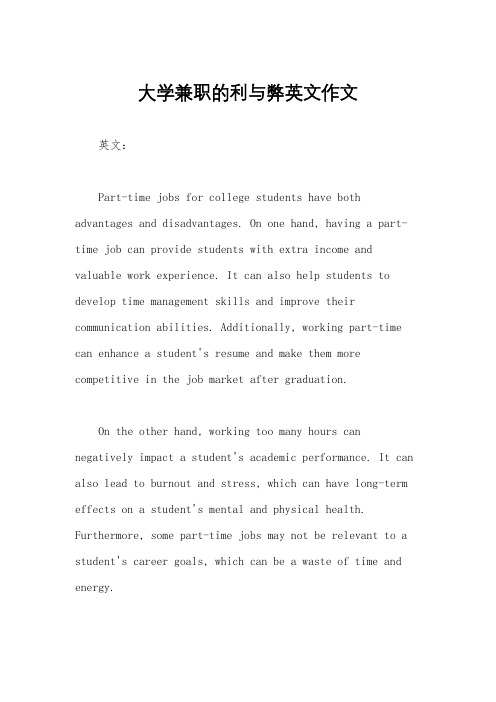
大学兼职的利与弊英文作文英文:Part-time jobs for college students have both advantages and disadvantages. On one hand, having a part-time job can provide students with extra income and valuable work experience. It can also help students to develop time management skills and improve their communication abilities. Additionally, working part-time can enhance a student's resume and make them more competitive in the job market after graduation.On the other hand, working too many hours can negatively impact a student's academic performance. It can also lead to burnout and stress, which can have long-term effects on a student's mental and physical health. Furthermore, some part-time jobs may not be relevant to a student's career goals, which can be a waste of time and energy.Personally, I have experienced both the benefits and drawbacks of having a part-time job in college. During my sophomore year, I worked part-time as a tutor for a local company. This job allowed me to earn extra money and improve my communication skills. However, during my junior year, I worked too many hours as a server at a restaurant, which negatively impacted my grades and caused me to feel burnt out.In conclusion, having a part-time job in college can be beneficial, but it is important for students to find a balance between work and academics. It is also important to choose a job that is relevant to one's career goals and to prioritize self-care.中文:大学生兼职既有利也有弊。
上学和打工的利弊英语作文
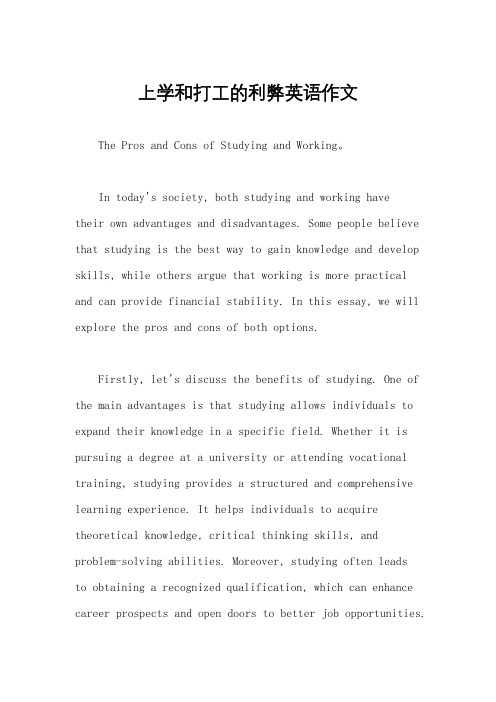
上学和打工的利弊英语作文The Pros and Cons of Studying and Working。
In today's society, both studying and working havetheir own advantages and disadvantages. Some people believe that studying is the best way to gain knowledge and develop skills, while others argue that working is more practical and can provide financial stability. In this essay, we will explore the pros and cons of both options.Firstly, let's discuss the benefits of studying. One of the main advantages is that studying allows individuals to expand their knowledge in a specific field. Whether it is pursuing a degree at a university or attending vocational training, studying provides a structured and comprehensive learning experience. It helps individuals to acquire theoretical knowledge, critical thinking skills, andproblem-solving abilities. Moreover, studying often leadsto obtaining a recognized qualification, which can enhance career prospects and open doors to better job opportunities.Another advantage of studying is the opportunity to explore different subjects and interests. Students have the freedom to choose their majors and can delve deep into subjects they are passionate about. This not only allowsfor personal growth and self-discovery but also enables individuals to gain expertise in a particular field. Furthermore, studying provides a supportive environment where individuals can interact with like-minded peers and experienced professors, fostering intellectual growth and stimulating discussions.On the other hand, working also has its own set of advantages. Firstly, working allows individuals to gain practical experience and develop real-world skills. While studying provides theoretical knowledge, working provides hands-on experience that cannot be acquired solely through textbooks. This practical experience is highly valued by employers and can give individuals a competitive edge in the job market. Additionally, working provides individuals with a sense of independence and responsibility, as they learn to manage their time, meet deadlines, and workcollaboratively with colleagues.Furthermore, working offers financial stability. Unlike studying, where individuals often rely on scholarships, loans, or support from family, working allows individualsto earn a regular income. This financial independence provides individuals with the ability to support themselves, pay for their education, and cover their living expenses. Moreover, working can also help individuals developfinancial management skills, such as budgeting and saving, which are crucial for long-term financial stability.However, it is important to consider the drawbacks of both studying and working. One of the disadvantages of studying is the cost associated with education. Tuition fees, textbooks, and other expenses can be a significant burden on individuals and their families. Moreover,studying often requires a substantial time commitment,which can limit individuals' ability to work and earn money. On the other hand, working may lead to a lack of time for personal pursuits and self-improvement. Long working hours and demanding schedules can leave individuals with littletime for leisure activities or further education.In conclusion, both studying and working have their own advantages and disadvantages. Studying provides individuals with knowledge, qualifications, and personal growth, while working offers practical experience and financial stability. Ultimately, the decision between studying and working depends on an individual's goals, interests, and circumstances. It is important to carefully consider the pros and cons of each option before making a decision that aligns with one's aspirations and aspirations.。
大学前工作的好处和坏处英语作文

大学前工作的好处和坏处英语作文The Benefits and Drawbacks of Working Before College Working before college can have both advantages and disadvantages. On the one hand, it allows students to gain practical work experience, develop important skills, and earn some income. This can enhance their resume and provide a better understanding of the real world. Additionally, working can help build responsibility, time management, and communication skills.On the other hand, working before college may also present some challenges. It can potentially impact academic performance if work commitments take up a significant amount of time and energy. work and studies can be difficult, and there is a risk of feeling overwhelmed.Moreover, early exposure to the workplace may lead to early burnout or limited time for personal growth and exploration.Ultimately, the decision to work before college depends on individual circumstances and priorities. It is important to carefully consider the pros and cons and make a choice that aligns with one's goals and capabilities. Seeking a balance between work and education is crucial to ensure a successful college experience.。
大学兼职的利弊英语作文
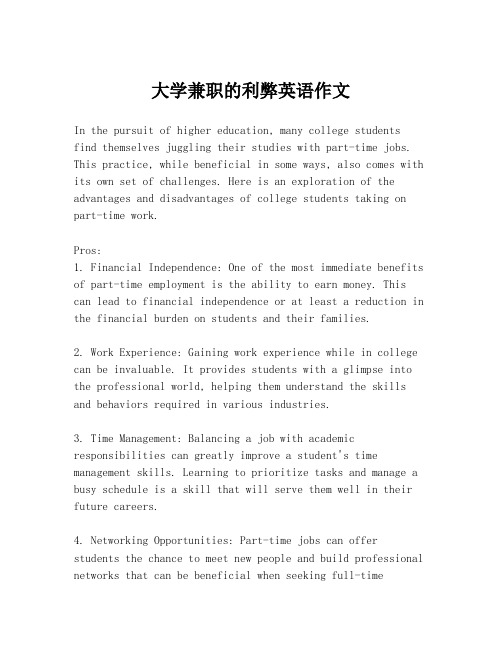
大学兼职的利弊英语作文In the pursuit of higher education, many college studentsfind themselves juggling their studies with part-time jobs. This practice, while beneficial in some ways, also comes with its own set of challenges. Here is an exploration of the advantages and disadvantages of college students taking on part-time work.Pros:1. Financial Independence: One of the most immediate benefits of part-time employment is the ability to earn money. This can lead to financial independence or at least a reduction in the financial burden on students and their families.2. Work Experience: Gaining work experience while in college can be invaluable. It provides students with a glimpse into the professional world, helping them understand the skills and behaviors required in various industries.3. Time Management: Balancing a job with academic responsibilities can greatly improve a student's time management skills. Learning to prioritize tasks and manage a busy schedule is a skill that will serve them well in their future careers.4. Networking Opportunities: Part-time jobs can offer students the chance to meet new people and build professional networks that can be beneficial when seeking full-timeemployment after graduation.5. Skill Development: Work environments often encourage the development of soft skills such as communication, teamwork, and problem-solving, which are highly transferable and sought after by employers.Cons:1. Stress and Burnout: Juggling the demands of a job with the rigors of college coursework can be stressful. Overcommitting can lead to burnout, which can negatively impact both academic performance and mental health.2. Impact on Academic Performance: There is a risk that part-time work might distract from studies, leading to lower grades or a prolonged time to complete a degree.3. Limited Social Life: With less free time, students who work part-time may find it challenging to participate in social activities and extracurricular clubs, which are important for personal development and building friendships.4. Potential for Exploitation: Some part-time jobs, particularly in the service industry, may not offer the best working conditions or pay. Students might find themselves in exploitative situations without adequate compensation for their time.5. Lack of Relevance: Not all part-time jobs are related to a student's field of study or career goals. Unrelated work might not add significant value to their resumes or personalgrowth.In conclusion, while part-time jobs can offer college students financial benefits and valuable life skills, they must be approached with caution to ensure they do not detract from academic success and personal well-being. It is crucial for students to find a balance that works for them, considering the nature of their studies, the demands of the job, and their own health and happiness.。
看书的利弊英语作文带翻译
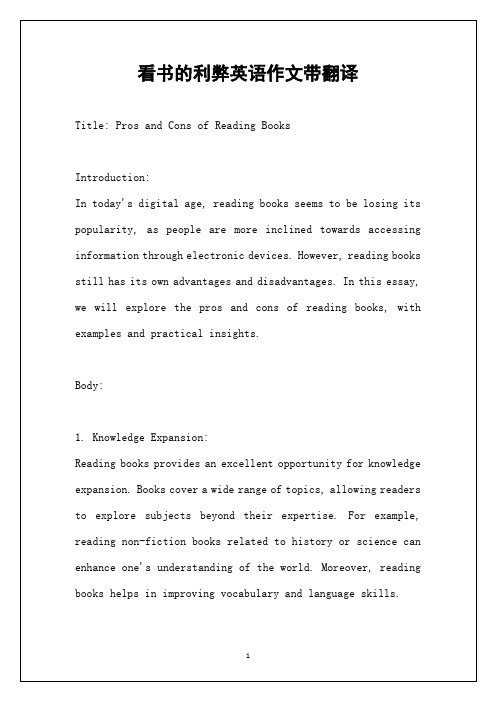
5. Time-consuming and Limiting Resource:
One of the drawbacks of reading books is that it can be time-consuming. With the availability of instant information on the internet, reading books might seem like a slower way to access knowledge. Moreover, books often have limited perspectives and can be biased, as authors portray their own opinions and beliefs. It is crucial for readers to have a critical mindset while reading and not take everything at face value.
2. Mental StimulaБайду номын сангаасion:
Reading books stimulates the mind and enhances cognitive abilities. Through reading, one can develop critical thinking skills and improve problem-solving abilities. Books also expose readers to different perspectives and ideas, promoting an open and creative mindset. For instance, reading fiction books allows readers to immerse themselves in a different world and empathy for characters.
校园兼职利弊英语作文
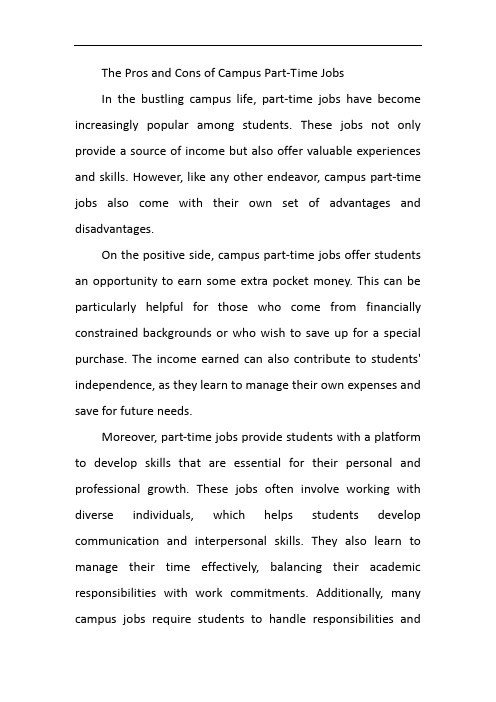
The Pros and Cons of Campus Part-Time JobsIn the bustling campus life, part-time jobs have become increasingly popular among students. These jobs not only provide a source of income but also offer valuable experiences and skills. However, like any other endeavor, campus part-time jobs also come with their own set of advantages and disadvantages.On the positive side, campus part-time jobs offer students an opportunity to earn some extra pocket money. This can be particularly helpful for those who come from financially constrained backgrounds or who wish to save up for a special purchase. The income earned can also contribute to students' independence, as they learn to manage their own expenses and save for future needs.Moreover, part-time jobs provide students with a platform to develop skills that are essential for their personal and professional growth. These jobs often involve working with diverse individuals, which helps students develop communication and interpersonal skills. They also learn to manage their time effectively, balancing their academic responsibilities with work commitments. Additionally, many campus jobs require students to handle responsibilities andmake decisions, thereby fostering their leadership and decision-making abilities.However, the disadvantages of campus part-time jobs are also worth considering. One of the main drawbacks is the potential impact on academic performance. If students overburden themselves with work, they may find it difficult to keep up with their studies, leading to a decline in grades or even the risk of failing courses. This can have long-term consequences on their future career prospects.Another issue is the potential for work-related stress and fatigue. Balancing studies with a part-time job can be challenging, and students may feel overwhelmed by the demands of both. This can lead to feelings of exhaustion and anxiety, affecting their mental health and overall well-being.Furthermore, some campus jobs may not align with students' interests or career aspirations. While these jobs may provide valuable experiences, they may not contribute significantly to students' long-term career goals. In such cases, students may feel like they are wasting their time and effort on jobs that do not align with their future plans.To mitigate the negative effects of campus part-time jobs, students should approach them with caution and responsibility.They should ensure that their work schedule does not interfere with their studies and that they have sufficient time to complete their academic assignments. Additionally, students should prioritize their health and well-being, taking breaks when needed and seeking help if they feel overwhelmed.Moreover, students should choose part-time jobs that align with their interests and career aspirations. This will not only make the work more enjoyable but also help them develop skills that are relevant to their future careers. If possible, students can also seek part-time jobs that offer opportunities for professional development and networking, which can enhance their chances of success in the job market.In conclusion, campus part-time jobs have both advantages and disadvantages. While they provide students with an opportunity to earn money and develop skills, they can also pose challenges to their academic performance and mental health. Therefore, students should carefully consider the pros and cons of taking up a part-time job and make informed decisions based on their personal circumstances and goals. By approaching campus part-time jobs with caution and responsibility, students can maximize their benefits while minimizing the potential negative impacts.。
上学与工作英语作文
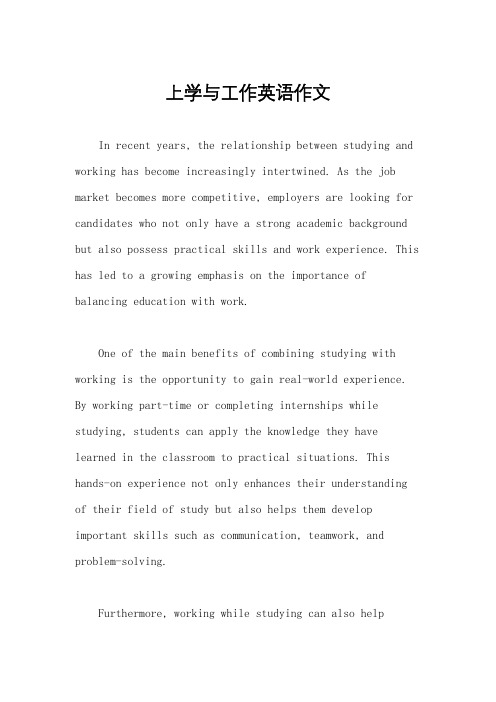
上学与工作英语作文In recent years, the relationship between studying and working has become increasingly intertwined. As the job market becomes more competitive, employers are looking for candidates who not only have a strong academic background but also possess practical skills and work experience. This has led to a growing emphasis on the importance of balancing education with work.One of the main benefits of combining studying with working is the opportunity to gain real-world experience. By working part-time or completing internships while studying, students can apply the knowledge they have learned in the classroom to practical situations. This hands-on experience not only enhances their understanding of their field of study but also helps them develop important skills such as communication, teamwork, and problem-solving.Furthermore, working while studying can also helpstudents build a professional network. By interacting with professionals in their field, students can make valuable connections that may lead to job opportunities in the future. These connections can also provide mentorship and guidance as students navigate their academic and career paths.In addition, working while studying can help students become more financially independent. Many students struggle to afford the rising costs of tuition, textbooks, andliving expenses. By working part-time, students can earn money to support themselves and reduce their reliance on student loans or financial aid.However, it is important for students to strike a balance between studying and working. While gaining work experience is valuable, students should not allow their jobs to interfere with their academic performance. It is crucial for students to manage their time effectively and prioritize their studies to ensure they are meeting their academic goals.In conclusion, the relationship between studying and working is becoming increasingly important in today's competitive job market. By combining education with work experience, students can gain valuable skills, build professional networks, and become more financially independent. However, it is essential for students to strike a balance between their studies and work to ensure they are successful in both areas.。
读书的利与弊英文作文
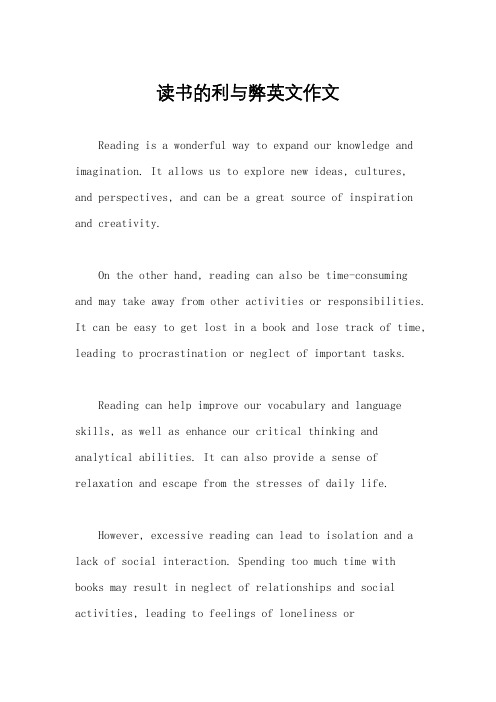
读书的利与弊英文作文Reading is a wonderful way to expand our knowledge and imagination. It allows us to explore new ideas, cultures, and perspectives, and can be a great source of inspiration and creativity.On the other hand, reading can also be time-consuming and may take away from other activities or responsibilities. It can be easy to get lost in a book and lose track of time, leading to procrastination or neglect of important tasks.Reading can help improve our vocabulary and language skills, as well as enhance our critical thinking and analytical abilities. It can also provide a sense of relaxation and escape from the stresses of daily life.However, excessive reading can lead to isolation and a lack of social interaction. Spending too much time with books may result in neglect of relationships and social activities, leading to feelings of loneliness ordisconnection from the world around us.In conclusion, while reading can bring many benefits, it is important to find a balance and not let it consumeall of our time and attention. It is important to enjoy the benefits of reading while also engaging in other activities and maintaining a healthy social life.。
读书的坏处英文作文

读书的坏处英文作文英文:Reading is often considered a good habit, but there are also some downsides to it. Firstly, reading can be very time-consuming. When you get hooked on a book, you may end up spending hours and hours reading, which can take away from other important activities, such as exercise, socializing, or work. Secondly, reading can be addictive.It can be hard to put a good book down, and you may find yourself neglecting other responsibilities in order to read more. Finally, reading can be mentally exhausting. Ifyou're reading a difficult or dense text, it can be tiring to concentrate for long periods of time.中文:读书常被认为是一种好习惯,但也有一些缺点。
首先,读书可能非常耗时。
当你迷上一本书时,你可能会花费数小时读书,这可能会占用其他重要活动的时间,比如运动、社交或工作。
其次,读书可能会上瘾。
很难放下一本好书,你可能会发现自己为了读更多而忽略了其他责任。
最后,读书可能会让人精神疲劳。
如果你正在阅读一本难懂或密集的文本,长时间集中注意力可能会很累。
大学生做兼工作有利有弊,你的看法英语作文
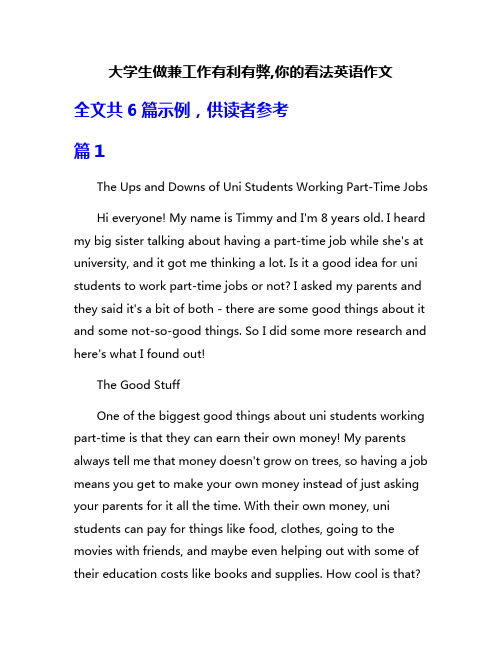
大学生做兼工作有利有弊,你的看法英语作文全文共6篇示例,供读者参考篇1The Ups and Downs of Uni Students Working Part-Time JobsHi everyone! My name is Timmy and I'm 8 years old. I heard my big sister talking about having a part-time job while she's at university, and it got me thinking a lot. Is it a good idea for uni students to work part-time jobs or not? I asked my parents and they said it's a bit of both - there are some good things about it and some not-so-good things. So I did some more research and here's what I found out!The Good StuffOne of the biggest good things about uni students working part-time is that they can earn their own money! My parents always tell me that money doesn't grow on trees, so having a job means you get to make your own money instead of just asking your parents for it all the time. With their own money, uni students can pay for things like food, clothes, going to the movies with friends, and maybe even helping out with some of their education costs like books and supplies. How cool is that?Another awesome thing is that working part-time helps uni students learn all sorts of useful life skills. Things like time management (getting all their uni work and job shifts sorted), customer service (being nice to customers or clients), and just general work experience. All of these skills will come in super handy when they graduate and start looking for a full-time career job. Employers love to see that someone has hadpart-time jobs before because it shows they know how to work hard.Part-time jobs can also be a great way for uni students to explore different career paths while they're still studying. If someone is doing an accounting degree but works as a waiter on the weekends, they might realize they actually like hospitality and restaurants more than number-crunching. Or maybe someone studying engineering gets a job in retail and finds out they love working with people more than machines. Having different job experiences gives uni students a better idea of what they might want to do after graduating.The Not-So-Good StuffUnfortunately, there are also some downsides to uni students working part-time jobs. One of the biggest problems is that it can make their schedules super duper busy and stressful.Picture this: they have classes and assignments to do for uni, plus work shifts on top of that, PLUS they need to fit in time for studying, hanging out with friends, sleeping, and you know, actually having a life outside of work and uni. That's a lot for one person to juggle! If they're not careful, they could end up feeling overwhelmed and burnt out.Another not-so-good thing is that working part-time jobs can sometimes get in the way of a uni student's studies. If they're spending most of their free time at work instead of studying or doing assignments, their grades could start to slip. And we all know good grades are really important for getting into good universities and finding great jobs later on. It's hard to stay focused on uni work when you're tired from late-night shifts or busy with customers at your job.Part-time jobs also don't always pay that much, especially the kinds of casual, unstable jobs that many uni students do. So while they're earning some money, it might not really be enough to make a huge difference compared to the time and effort they're putting in. And if they're mostly using that money for rent, food, and social activities instead of saving it up, they might not end up much better off financially in the long run.My Two CentsSo those are some of the major pros and cons of uni students taking on part-time work from what I could find out. Personally, I can see good points on both sides of the argument. If I was a uni student, I think I would probably try to get apart-time job, but just a small one with not too many hours per week. That way I could earn a little bit of spending money, get some work experience, but not let the job take over my whole life or mess up my studies too much.I reckon the key is finding that happy balance - a part-time job that lets you take advantage of the good things it offers without going overboard with the not-so-good stress and distractions. Maybe start with just a single weekly shift to get a feel for juggling work and uni, then take on more hours later if you can handle it. That seems like the smart way to go about it to me.But those are just my thoughts as an 8-year-old kid! What do you all think about uni students working part-time jobs? I'd love to hear from uni students, parents, teachers, and anyone else who has experiences or opinions to share. Leave a comment and let me know! Thanks for reading my essay - I'll be back again soon with more kid thoughts on adult topics.篇2Working While Studying - The Ups and DownsHey guys! Today I want to talk about something lots of big kids have to think about - whether to get a part-time job while they are studying at university or not. Some people say it's a great idea, but others disagree. I've been asking around and this is what I've learned!The Positives of Having a JobFirst up, let's look at some of the good things about university students working part-time jobs. One of the biggest pros is making money! University is expensive with all the fees, books, rent and living costs. Having a job means you can pay for some of those things yourself instead of relying just on your parents or loans. That's got to feel pretty good to be more independent.Another plus is gaining work experience. When you finally graduate and look for a full-time career job, employers usually want to see that you've had some kind of job before. Having a part-time job shows you know how to be responsible, manage your time, deal with customers or colleagues, and understand how jobs work. It makes you look more hireable!Part-time jobs can also help students explore different career paths while they study. If you're not 100% sure what you want to do after university, trying out different jobs can help you get a feel for different industries and roles. Who knows, you might find your calling at that random shop job!Some students really enjoy the social side of working too. Being at uni is fun, but it's also quite insular. Having a job gets you meeting new kinds of people from the wider community. It stops your whole life being about testing and studying.The Negatives of Juggling Study & WorkOn the flip side, having a part-time job as a student definitely has its downsides too. The biggest issue is finding the right work-life balance and not letting a job squeeze out time for your actual degree studies. Students who work too many hours can struggle to attend classes, get assignments done on time, and perform well overall. Passing and graduating has to be the priority.Part-time jobs are also physically and mentally draining for students who are already stressed trying to keep up with uni work. After sitting through lectures and stressing over essays and exams all week, the last thing you might feel like is draggingyourself to a tiring job at night or on weekends. It can be make students feel burnt out and overwhelmed.There are also opportunity costs to consider. Time spent working is time that could have been spent studying harder, doing internships and work experience more related to your degree, volunteering, joining clubs, or just relaxing. As a student, these years are a unique window to invest heavily in your education and future.Some Final ThoughtsSo those are some of the big pros and cons from my perspective. Of course, every student's situation will be different in terms of finances, degree, goals and what job opportunities are available. Some people will be able to easily balance apart-time job with no stress, while for others it may be a terrible idea that tanks their grades.If you do decide to work while studying, it's probably wise to not go overboard with too many hours, and try to find something at least a little related to your future profession. Managing your time and energy properly is super important when juggling commitments.I'm just a kid, so what do I know? But I hope this has given you a better idea of the ups and downs university students face when choosing whether or not to be job-holding studybugs! Let me know if you have any other thoughts after reading this. Laters gators!篇3The Ups and Downs of Uni Students With Part-Time JobsHi there! My name is Jamie and I'm going to tell you all about university students who also have part-time jobs. It's a pretty common thing these days. Some people think it's a great idea, while others aren't so sure. I've given it a lot of thought and I have some thoughts to share with you!First up, let's talk about the good things - the pros - of uni students working part-time jobs. One huge benefit is that they can earn their own money! Instead of always asking mom and dad for cash, they can pay for things themselves like food, clothes, going to the movies with friends, you name it. Having a job teaches important life skills too, like being responsible, managing your time well, and dealing with bosses and customers. It's awesome practice for the "real world" after graduating.Another awesome pro is that a part-time job looks really good on a resume/CV when applying for graduate jobs later on. Employers love to see work experience, even if it was just waiting tables or stacking shelves at the supermarket. It shows you have a good work ethic. Plus, you never know, some uni students even get hired full-time at the places they worked part-time! How neat would that be?Part-time jobs can also be really fun and social. You get to make new friends with your co-workers. My cousin worked at a cafe and she said it was the highlight of her week, getting to work with her barista buddies and have a good natter while making cappuccinos. If you're really lucky, you might even score a staff discount at a cool shop or restaurant!On the other hand, there are certainly some downsides to think about too. One major con is that working while studying full-time at university can be incredibly draining and stressful. You have to attend classes, complete assignments, study for exams, AND work a job on top of it all. That's a lot for one person to juggle! If you're not careful, your grades could really suffer.It's also pretty tricky to find a part-time job with shifts that conveniently fit in around your uni timetable. A lot of casual jobs need you to work nights and weekends, which are the timesyou'll want to be studying, going out with friends, or just relaxing at home. That sounds like a recipe for burnout if you ask me!Another drawback is that working part-time means less time for other cool extracurricular activities at uni. Sports teams, clubs, volunteering...all that great stuff has to take a backseat when you're balancing a job AND full-time study. Your uni experience could end up feeling like all work and no play, which isn't much fun at all!Finally, there's the cost to consider as well. Workingpart-time means spending extra money on things like transport to/from your job, buying professional clothes for your job, paying tax...it all adds up! Sometimes the costs can cancel out the money you're earning. Though every little bit helps when you're a broke university student, I guess!So those are some of the major pros and cons about university students doing part-time work. When you weigh it all up, I reckon it comes down to this: a part-time job can be an awesome idea if you're an A-plus student who is brilliant at time management and thrives on being crazy busy. But if you're someone who struggles a bit with keeping on top of everything, having a job on top of uni could make life soooooo stressful.Personally, I'm going to wait until my final year of uni before I even think about getting a part-time job. I know my limits and I think trying to work and study full-time right now would just make me a big old stress ball! But that's just me. Every person has to weigh up the pros and cons for themselves.Well, that's all my thoughts on the ups and downs of uni students with part-time jobs! I reckon it's a tough decision with no clear right or wrong answer. Let me know what you think - would you try to fit in a job during uni? Thanks for reading, catch you later!篇4The Big Question: Should College Kids Have Little Jobs On The Side?Hi there! My name is Tommy and I'm 8 years old. My big sister Jessica just started college this year. She's really smart and worked super hard in high school to get into a fancy university. But now she has to pay a lot for tuition, books, housing and food. So she got a little job at the campus coffee shop to help pay for stuff.Some grown-ups think it's a good idea for college kids to have little part-time jobs. But others think it's not such a hot idea.There are some pros and cons to think about. I'll tell you all about them!The Good Stuff About College Kids WorkingMy mom says having a little job can teach kids responsibility and time management skills. Jessica has to follow a schedule and show up on time for her shifts. She can't just goof off all day! The job also forces her to budget her time wisely between work, classes and studying. Managing everything makes her feel productive and accomplished.Working allows college kids to earn their own spending money too. With her paycheck, Jessica can buy clothes, video games, concert tickets and all the ramen noodles she wants without constantly asking my parents for cash. Earning your own money gives you independence and freedom.Jessica's job at the coffee shop also lets her practice important life skills. She has to be friendly and helpful to customers, manage conflicts between coworkers, and use the cash register correctly. The experience gives her skills she can use at future jobs after college. It looks good on her resume too!Jessica says interacting with different types of people at work has been really valuable as well. She gets to meet students,professors, staff and visitors from all over with diverse backgrounds and perspectives. It's helping her become more mature and culturally aware.The Not-So-Good StuffOn the other hand, Jessica's little job does seem to create some challenges too. She frequently stays up late studying after her closing shifts, causing her to feel tired and unmotivated in class the next day. Balancing work and academics makes her stressed and anxious a lot of the time.The smelly coffee fumes at Jessica's job also aggravate her asthma sometimes. And her co-workers can be loud and distracting when she's trying to study between customers. The job environment isn't always ideal for focusing.Jessica also misses out on some social events with friends because of her work schedule. She had to skip a fun laser tag night last month to cover someone's shift. Jobs can limit your free time and ability to get involved in campus life.Money is another issue. While Jessica does earn some spending cash, a lot of her paycheck goes towards necessities like groceries, utilities and loan payments. The little leftover isn't that much "fun money" in the end. And since she works so manyhours, she doesn't have as much time to focus on higher-paying internships or research positions that could boost her career prospects.Overall, I See Both Pros and ConsSo those are some of the big pros and cons about college kids working part-time jobs. There are good points andnot-so-good points to consider on both sides. Jessica says it really comes down to being a responsible person who manages time wisely.If a college student can handle the extra commitment, a little job can provide great experience, income and life skills. But if working causes too much stress or starts negatively impacting grades and campus involvement, then it may not be worth it. Each student needs to decide for themselves!Personally, I think it would be fun to have a little job scooping ice cream or working at an amusement park when I'm older. But school would definitely remain my top priority. What do you think? Should college kids work little jobs or just focus entirely on their studies? It's certainly something to ponder!篇5Being a University Student with a Part-Time JobHi everyone! My name is Emily and I'm 8 years old. My big sister Sophie just started university this year and she also has a part-time job at the mall. When I grow up, I want to go to university too, just like Sophie! But I'm not sure if I should get a part-time job when I'm a university student or just focus on my studies.My mom and dad say that having a part-time job in university can be really good because it helps you learn responsibility and time management skills. Sophie has to wake up early to get to her classes and then she works at the mall in the evenings and on weekends. My parents say this teaches her how to budget her time wisely and not procrastinate on her schoolwork. They think this will really help Sophie when she graduates and gets a full-time job in the "real world."I can see how learning those skills could be super helpful. I know I have trouble sometimes remembering to do my chores and homework without my parents nagging me. If I had a job, I would have to get better at being responsible and doing things without being told. That's probably a good habit to build for the future.Another benefit of Sophie's part-time job is that it gives her spending money! She uses her paychecks to pay for her gas, car insurance, cell phone bill and fun things like going to movies and concerts with her friends. My parents don't have to give her as much money since she can pay for that stuff herself now. I bet it feels good for Sophie to be a little more independent and financially responsible.However, my parents also say that having a part-time job on top of being a full-time student can be really stressful and overwhelming. Sophie's schedule is super packed between classes, studying, working and trying to have a social life. Sometimes she looks really tired and cranky when she comes home from the mall after a long shift. My parents worry that working so much could cause her grades to slip if she's spreading herself too thin.I can understand why juggling so many responsibilities would be hard. When I have a lot of activities and chores piled on top of my schoolwork, I get really stressed out too. I can't imagine how much more difficult that must be with university-level classes and a real job! I don't know if I'd be able to handle that pressure without going crazy.My dad also points out that part-time jobs don't always relate to what you want to do as a career. So in some cases, it could be a waste of time that takes away from focusing on your actual field of study. For example, Sophie wants to be a teacher, but working at a clothing store doesn't really give her experience for that. My dad thinks she might be better off volunteering or getting an internship related to education instead.That's a good point. If I worked at a fast food restaurant or grocery store in university, it probably wouldn't teach me very much about being a doctor or scientist or whatever I end up wanting to be. An internship job seems way more valuable than just any old part-time gig. Although I guess the work experience, money and time management could still be useful no matter what kind of job it is.In the end, I guess there are pros and cons to getting a part-time job as a university student. It's probably a very personal decision based on each student's situation, needs and abilities. If you can handle the extra workload without stressing yourself out too much, a part-time job could teach you great life skills. But you also don't want to overcommit yourself and have your grades suffer.Me personally? I'm really not sure what I'll decide to do when I get to university. It might depend on what kind of program I'm in and how challenging the coursework is. For now, I'll just focus on being a hard worker with my schoolwork and chores at home. That way, I can start building good habits and responsibility way before I become a university student. We'll see in 10 years if I also end up being a part-time employee like my sister Sophie!篇6Being a College Kid With a Job is Really Hard But Also Super Cool!Hi everyone! My name is Billy and I'm 8 years old. My big brother Jake just started college last year and he also got a part-time job working at the grocery store near our house. I think it's really cool that he's in college AND has a job! But it also seems really really hard. Let me tell you all about it!First of all, going to college is already a huge deal. My brother has to go to classes, study for tests, write a bajillion papers, and do all sorts of other school stuff. I'm just a kid in elementary school and I get tired after a long day! I can't imagine how exhausted Jake must feel after sitting through lectures anddoing homework for hours and hours. College is grown-up school so it's way more work than kid school.On top of all his college responsibilities, Jake also has to go to his job at the grocery store a few nights a week and on weekends. He works the cash registers, stocks the shelves, and does other jobs to help the customers. His job shifts are usually 4-6 hours long! After dealing with college all day, he then has to quickly eat dinner and go stand on his feet for several more hours at work. Just thinking about that makes me want to take a nap!Jake says the hardest part is not having much free time anymore. When he's not in class or studying, he's working his job. And when he's not working, he has piles of homework and assignments to catch up on. He hardly ever has time to hang out with friends, play video games, or just relax anymore. On weekends, he has to divide his time between getting school work done and going to his job shifts. Jake says he feels like a robot most days - just going going going from one task to the next with no breaks!It sounds absolutely exhausting being a college student with a part-time job. I'm getting tired just from writing about it!You're probably wondering why Jake even bothers with having ajob if it makes his life so difficult and stressful. Well, there are actually some really good reasons that make it worth it for him.The biggest reason is money. College is SUPER expensive - way more than Jake expected. Tuition costs, textbooks, housing, food, and everything else adds up to tons of money that he and my parents have to pay. Having a part-time job helps Jake earn his own money to cover some of those crazy costs. He makes around 400 every two weeks from his grocery job, which is a ton for a kid! With that money, he can pay for some of his textbooks, meals, gas for his car, and fun things like going to movies or concerts occasionally. Without a job, Jake would have hardly any spending money and would be constantly stressing about finances.Another big benefit is that having a job gives Jake really important life experience. He's learning how to show up on time, be responsible, work as part of a team, provide good customer service, and handle money properly. Those are all skills he'll need no matter what career he pursues after graduating college. The job is helping prepare him for the real working world of adulthood! My parents always tell Jake how proud they are of his hard work and mature attitude with juggling so many responsibilities.Jake has also met a lot of new people and made friends through his job at the grocery store. He works with teenagers and adults of all ages from our community. It's helped Jake become more comfortable talking to different types of people beyond just his college peers. Making connections could help him land internships or find a good job after college too. Networking is really important in the working world from what I've heard!So in conclusion, being a college student with a part-time job is no walk in the park. It's an incredibly difficult balancing act that leaves little free time and can be draining both physically and mentally. At the same time, a part-time job provides crucial financial support, valuable professional experience, and opportunities to develop important life skills along with making vital social connections. For hardworking students like my brother Jake who are motivated to get ahead, taking on the major challenge of a job seems worth it in the long run.I just hope Jake doesn't burn himself out before he even finishes college! I'm already tired just from writing this essay about his hectic lifestyle. I'll probably take a nice long nap before working on my kindergarten homework later. Being an adult sounds way too complicated - I'm perfectly happy being a kid fornow! College and part-time jobs can wait until I'm much much older. But good luck to Jake and all the other college students out there hustling and working hard every single day!。
高校兼职利与弊英文作文
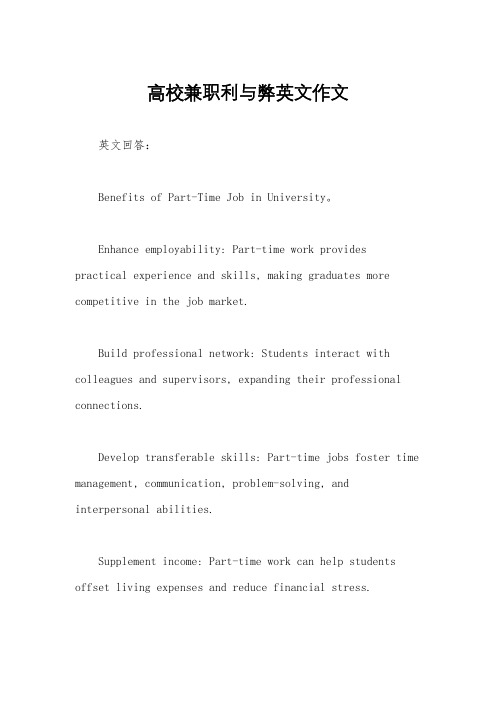
高校兼职利与弊英文作文英文回答:Benefits of Part-Time Job in University。
Enhance employability: Part-time work providespractical experience and skills, making graduates more competitive in the job market.Build professional network: Students interact with colleagues and supervisors, expanding their professional connections.Develop transferable skills: Part-time jobs foster time management, communication, problem-solving, and interpersonal abilities.Supplement income: Part-time work can help students offset living expenses and reduce financial stress.Gain industry insights: Part-time employment in arelated field offers valuable industry knowledge and perspectives.Improve work ethic: Working while studying instills responsibility, punctuality, and a strong work ethic.Explore career interests: Part-time jobs allow students to explore different industries and job roles, helping them identify their interests.Build confidence: Success in a part-time role can enhance students' self-esteem and confidence in their abilities.Practice work-life balance: Juggling studies and part-time work teaches students to manage their time effectively.Disadvantages of Part-Time Job in University。
【最新2019】雅思写作素材:上大学前参加工作的利弊-推荐word版 (2页)
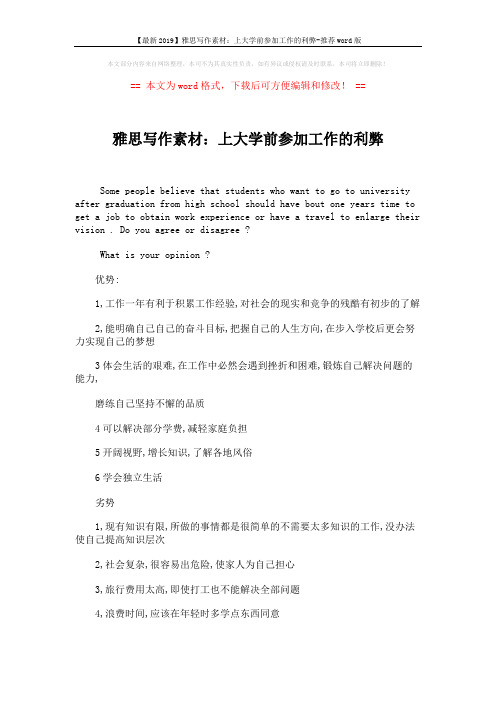
【最新2019】雅思写作素材:上大学前参加工作的利弊-推荐word版
本文部分内容来自网络整理,本司不为其真实性负责,如有异议或侵权请及时联系,本司将立即删除!
== 本文为word格式,下载后可方便编辑和修改! ==
雅思写作素材:上大学前参加工作的利弊
Some people believe that students who want to go to university after graduation from high school should have bout one years time to get a job to obtain work experience or have a travel to enlarge their vision . Do you agree or disagree ?
What is your opinion ?
优势:
1,工作一年有利于积累工作经验,对社会的现实和竞争的残酷有初步的了解
2,能明确自己自己的奋斗目标,把握自己的人生方向,在步入学校后更会努力实现自己的梦想
3体会生活的艰难,在工作中必然会遇到挫折和困难,锻炼自己解决问题的
能力,
磨练自己坚持不懈的品质
4可以解决部分学费,减轻家庭负担
5开阔视野,增长知识,了解各地风俗
6学会独立生活
劣势
1,现有知识有限,所做的事情都是很简单的不需要太多知识的工作,没办法使自己提高知识层次
2,社会复杂,很容易出危险,使家人为自己担心
3,旅行费用太高,即使打工也不能解决全部问题
4,浪费时间,应该在年轻时多学点东西同意。
大学生兼职利弊英语作文
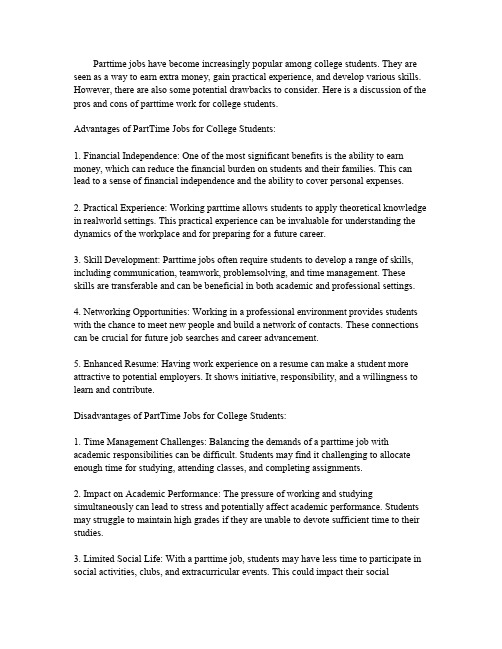
Parttime jobs have become increasingly popular among college students. They are seen as a way to earn extra money, gain practical experience, and develop various skills. However, there are also some potential drawbacks to consider. Here is a discussion of the pros and cons of parttime work for college students.Advantages of PartTime Jobs for College Students:1. Financial Independence: One of the most significant benefits is the ability to earn money, which can reduce the financial burden on students and their families. This can lead to a sense of financial independence and the ability to cover personal expenses.2. Practical Experience: Working parttime allows students to apply theoretical knowledge in realworld settings. This practical experience can be invaluable for understanding the dynamics of the workplace and for preparing for a future career.3. Skill Development: Parttime jobs often require students to develop a range of skills, including communication, teamwork, problemsolving, and time management. These skills are transferable and can be beneficial in both academic and professional settings.4. Networking Opportunities: Working in a professional environment provides students with the chance to meet new people and build a network of contacts. These connections can be crucial for future job searches and career advancement.5. Enhanced Resume: Having work experience on a resume can make a student more attractive to potential employers. It shows initiative, responsibility, and a willingness to learn and contribute.Disadvantages of PartTime Jobs for College Students:1. Time Management Challenges: Balancing the demands of a parttime job with academic responsibilities can be difficult. Students may find it challenging to allocate enough time for studying, attending classes, and completing assignments.2. Impact on Academic Performance: The pressure of working and studying simultaneously can lead to stress and potentially affect academic performance. Students may struggle to maintain high grades if they are unable to devote sufficient time to their studies.3. Limited Social Life: With a parttime job, students may have less time to participate in social activities, clubs, and extracurricular events. This could impact their socialdevelopment and the overall college experience.4. Physical and Mental Fatigue: Working long hours in addition to attending classes can lead to physical and mental exhaustion. This fatigue can affect a students health and wellbeing, as well as their ability to concentrate and perform well academically.5. Potential for Exploitation: Unfortunately, some employers may take advantage of students inexperience, leading to issues such as low pay, poor working conditions, or even job insecurity.In conclusion, while parttime jobs offer numerous benefits, they also come with potential drawbacks. Students should carefully consider their personal circumstances, academic goals, and the demands of the job before deciding to take on parttime work. Its essential to find a balance that allows for both personal growth and academic success.。
雅思写作大作文高分范文:关于大学学习与工作

【导语】为了大家能够更好地备考雅思考试,今天特意为大家整理了雅思写作大作文高分范文:关于大学学习与工作,希望对大家有帮助!题目:Some people believe that studying at university or college is the best route to a successful career, while others believe that it is better to get a job straight after school.Discuss both views and give your opinion.中文翻译:有些人认为,在大学或大学学习是成功事业的途径,而另一些人认为,是在毕业后直接上班。
讨论这两种观点,并给出您的意见。
范文:When they finish school, teenagers face the dilemma of whether to get a job or continue their education. While there are some benefits to getting a job straight after school, I would argue that it is better to go to college or university.The option to start work straight after school is attractive for several reasons. Many young people want to start earning money as soon as possible. In this way, they can become independent, and they will be able to afford their own house or start a family. In terms of their career, young people who decide to find work, rather than continue their studies, may progress more quickly. They will have the chance to gain real experience and learn practical skills related to their chosen profession. This may lead to promotions and a successful career.On the other hand, I believe that it is more beneficial for students to continue their studies. Firstly, academic qualificationsare required in many professions. For example, it is impossible to become a doctor, teacher or lawyer without having the relevant degree. As a result, university graduates have access to more and better job opportunities, and they tend to earn higher salaries than those with fewer qualifications. Secondly, the job market is becoming increasingly competitive, and sometimes there are hundreds of applicants for one position in a company. Young people who do not have qualifications from a university or college will not be able to compete.For the reasons mentioned above, it seems to me that students are more likely to be successful in their careers if they continue their studies beyond school level.(271 words, band 9)。
校园兼职利弊英语作文
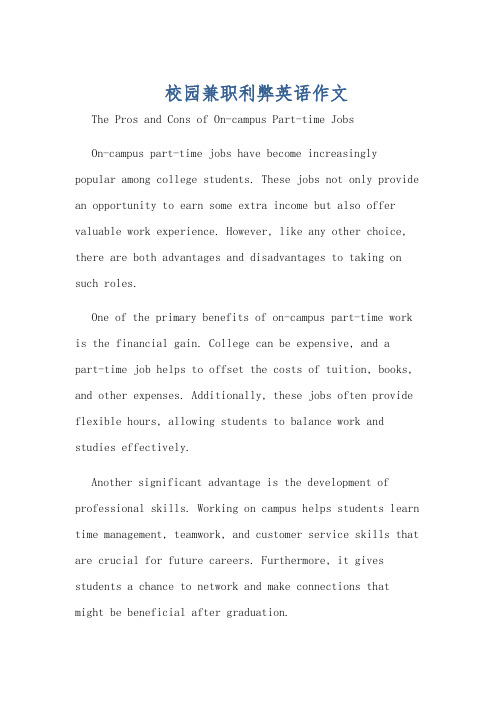
校园兼职利弊英语作文The Pros and Cons of On-campus Part-time JobsOn-campus part-time jobs have become increasingly popular among college students. These jobs not only provide an opportunity to earn some extra income but also offer valuable work experience. However, like any other choice, there are both advantages and disadvantages to taking on such roles.One of the primary benefits of on-campus part-time work is the financial gain. College can be expensive, and apart-time job helps to offset the costs of tuition, books, and other expenses. Additionally, these jobs often provide flexible hours, allowing students to balance work and studies effectively.Another significant advantage is the development of professional skills. Working on campus helps students learn time management, teamwork, and customer service skills that are crucial for future careers. Furthermore, it gives students a chance to network and make connections that might be beneficial after graduation.Despite these benefits, there are also drawbacks to consider. Firstly, part-time work can be demanding and may distract students from their studies. Balancing work, studies, and social life can be challenging, especially during exam periods. Secondly, on-campus jobs often pay minimum wage, which may not be sufficient to cover all expenses.Moreover, working on campus may limit the types of work experiences students can gain. Most on-campus jobs involve tasks like serving food, working in libraries, or assisting in administrative work, which may not directly relate to a student's field of study or future career aspirations.In conclusion, on-campus part-time jobs offer financial benefits and valuable work experience but can also pose challenges in balancing work and studies and may not always provide the most relevant work experience. Students should carefully weigh the pros and cons before deciding to take on such roles.校园兼职的利弊校园兼职工作在大学生中越来越受欢迎。
- 1、下载文档前请自行甄别文档内容的完整性,平台不提供额外的编辑、内容补充、找答案等附加服务。
- 2、"仅部分预览"的文档,不可在线预览部分如存在完整性等问题,可反馈申请退款(可完整预览的文档不适用该条件!)。
- 3、如文档侵犯您的权益,请联系客服反馈,我们会尽快为您处理(人工客服工作时间:9:00-18:30)。
Nowadays college students or even high school students start to work at a younger age. Do you think that it is a positive or negative development?
Adults often regard their school years as the best time of their lives. However, mankind is apt to forget pain once it is passed. It was indeed not easy to be a student, even more so nowadays. Skyrocketing tuition fees and slowing economy compel students to work harder and earlier.
It is a rather unsavory trend(这种趋势是不容乐观的). Some students begin working part-time at the tender age of fourteen. Regardless of its legality, the job options can be reasonably expected. Most work as salespersons, which not only exhausts them physically, but also interferes with their study. Even for those under better working conditions, say private tutors, part-time jobs invariably rob them of their precious time.
However, be that as it may(尽管如此), I still regard this as a positive development. Some good must come out of our mental and physical exertions, provided that they are not excessive. By taking intellectually challenging jobs students learn to apply what they are taught in class to real life. Even pure manual work can cultivate students’hardiness, discipline and will power(锻炼毅力,纪律性和意志力). Provided that competition is to get fiercer, they need to know what life is really like earlier rather than later, a taste of which can be got through working. In addition, these early working experiences are conductive to their future career. Part-time jobs often lead to internship and eventually to full-time employment. The work experience is valuable in itself. It teaches a person how to fit into an
organization, how to work with others and how to deal with disgruntled customers. Working is often a most demanding yet rewarding experience.
Sooner or later, we have to fend for ourselves. So why wait until the last minute? Working on a part-time basis prepares us to step out of the ivory tower and into the real world.
关于trend.
Adverse(不利的)disturbing(令人烦忧的)worrying(令人担忧的)unfortunate(不幸的)apparent(明显的)discernible(显著的)dominant (主导的)prevailing(主流的)accelerating(加速的)。
